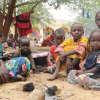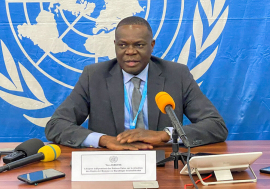Africa on the road to recovery
Africa on the road to recovery
Prospects are looking up again for African economies. With 2009 now over, so seem to be the continent’s hardest days. Africa is projected to grow by 4.3 per cent in 2010, nearly three times higher than in 2009, according to a recent UN report, World Economic Situation and Prospects 2010. “There is growing sentiment on the continent that the worst of the economic and financial crisis has passed as signs of recovery begin to appear,” write the authors.
Amid credible signs of a global economic recovery – driven by the economic stimulus policies that have been implemented throughout the world – Africa is predicted to be the second fastest growing region in the world. Only the East and South Asia region is projected to rank ahead of the continent, with a growth estimate of 6.4 per cent. In comparison, growth in the Euro region is forecast at 0.4 per cent, while it will stand at 3.4 per cent in Latin America. UN economic forecasters predict that South Africa, the largest African economy, will fare better than Brazil, while Nigeria, the second largest economy on the continent, will outperform Mexico.

Overall, Africa’s recovery in 2010 will mainly depend on the revival of the global economy. The continent will benefit from the many fiscal stimulus plans which have boosted domestic demand around the world. This in turn is expected to increase demand for oil and minerals and contribute to significant turnarounds for some African countries. Additionally, Africa will profit from a gradual recovery in foreign direct investment (FDI) and other private capital flows.
However, beyond the near-future scenario, the report – jointly produced by the UN Department of Economic and Social Affairs, the UN Conference on Trade and Development and the five UN regional economic commissions – suggests that the economic crisis is expected to have long-lasting effects. Unemployment and underemployment will remain a major concern for the continent, affecting women and youth in particular. Food prices are expected to soar in many East African countries.
Moreover, the continued high dependence of most African economies on primary commodity exports, which are subject to fluctuations in demand and price, represent a key structural risk to Africa’s economic growth, warns the report.
2009, a lost year
Despite the recovery, African economies will remain well below potential in 2010, the UN report finds, since 2009 was the most difficult in recent history. Aggregate growth is estimated to have been 1.6 per cent last year, down from an annual average of about 5.7 per cent during the period 2002-2008.
East Africa – with the highest subregional growth rate in 2009 – reached only 3.8 per cent in growth. Southern Africa contracted by 1.7 per cent in 2009, the worst regional performance on the continent. West Africa and North Africa were more resilient, growing respectively by 2.4 per cent and 3.5 per cent.
The year was even worse for major oil-exporting African countries. Growth in Angola and Equatorial Guinea declined from an average of more than 16 per cent during 2004-2008 to 0.2 per cent and -3.4 per cent, respectively, in 2009. Countries specializing in agricultural exports faced a less severe slowdown, with Liberia, Malawi and Uganda registering above-average growth. Nigeria’s economy grew by 1.9 per cent, as declines in the industrial sector and crude oil production were offset by increases in agriculture.
Also in 2009, FDI flows to Africa declined, with Rwanda as the only exception.
Although the economic crisis has strained budgets in most African countries, Ghana and a few others managed to escape a deterioration of their fiscal balances in 2009.
Echoing many African governments’ arguments on the devastating impact the global downturn has had on their economies, the report notes that “2009 marked an unfortunate reversal of hard-earned social and economic gains that had been made in reducing both poverty and the large gap which separates Africa from its Millennium Development Goals (MDGs).”
Limited impact
According to the authors of the report, although the continent was affected by the impact of the global crisis, its consequences would have been more devastating had Africa been more closely connected to the world financial system. Due to their tighter linkages with the world economy, richer African countries like South Africa faced a stiffer decline in per-capita income than low-income countries. Like other developing regions, Africa was affected by the crisis mostly through trade channels, especially those countries whose growth relies massively on exports of energy, minerals and manufactured goods.
The impact of the financial and economic turmoil on Africa has been limited not only due to its weak linkages to international financial markets, but also because of sound economic policies. “Due to prudent management of public finances, during periods of robust growth,” the report argues, “many African countries entered the current crisis in a better fiscal position than in past crises.”
– Africa Renewal online












